八下教案unit1
八下英语unit1优秀教案
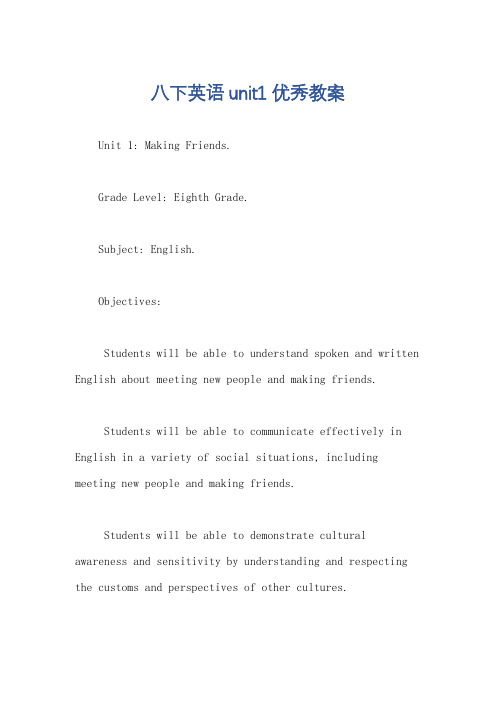
八下英语unit1优秀教案Unit 1: Making Friends.Grade Level: Eighth Grade.Subject: English.Objectives:Students will be able to understand spoken and written English about meeting new people and making friends.Students will be able to communicate effectively in English in a variety of social situations, including meeting new people and making friends.Students will be able to demonstrate cultural awareness and sensitivity by understanding and respecting the customs and perspectives of other cultures.Materials:Textbook: Any eighth-grade English textbook that includes a unit on making friends.Whiteboard or chart paper.Markers.Sticky notes.Handouts.Music player.Music.Procedure:Warm-up (5 minutes)。
Begin the lesson by asking students to think about atime when they met someone new.Have students share their experiences with the class.Introduction (10 minutes)。
人教版英语八年级下册【教案】Unit 1 Section B (人教)

Unit 1 What’s the matter?Section B本单元的主题是有关于身体健康。
这个话题是关乎我们每天的日常生活,所以有必要让学生了解相关的知识。
学生将会学会如何谈论他们的健康问题以及如何给予他人建议。
【知识目标】描述健康问题以及如何根据别人的健康问题提建议【能力目标】1.听懂谈论健康问题的对话材料2.能根据别人的健康问题提建议3.能写出重点单词和重点句型4.能描述怎样对待健康问题。
【情感目标】通过本课的阅读,培养学生关心他人身体健康的品质,并培养学生处理紧急事件的基本能力,树立在紧急事件时互相帮助的精神.【教学重点】1. 词汇:get into trouble ,fall down, be used to, run out (of), cut of, get out of; be in control of, keep on (doing sth.), give up.2. 句型:1. Do you have a fever? Yes, I do. No, I don't. I don't know.2. Does he have a toothache? Yes, he does.He should see a dentist and get an X-ray.3. What should she do? She should take her temperature.4. Should L put some medicine on it? Yes, you should No, you shouldn't.【教学难点】掌握情态动词should shouldn't.的用法;学习have的用法Multimedia,group work, cooperative discussionStep 1 Warm upReview the knowledge we have learned in Section AStep 2 Presentation1. 1aWhen these accidents happen, what should you do? Put the actions in order.Give Ss some time to finish this pat, then check the answers.2. 1bListen to the school nurse. Check the problems.Finally, check the answers.3. 1cAsk Ss to listen to the conversation again and write the letter of each treatment next to the problems in the chart above. Then, check the answers.Step 3 Consolidation1. 2aAccidents or problems can sometimes happen when we do sports. Write the letter of each sport next to each accident or problem that can happen.2. 2bFirst, lead Ss to read the instruction to know what to do in this activity and how to do it.Then, give Ss several minutes to read the passage and look up the new words in a dictionary. Ask them to underline some difficult language points as reading.After they finish reading, invite three Ss to read the passage.Lead Ss to read the passage together, call attention to the pronunciation and tone. Explain some key words and expressions.3. 2cRead the statements and circle True, False or Don't Know. Then,check the answers.Step 4 Practice1. 2dFirst, read the passage again and answer the questions.Then, invite several Ss to present their answers.Finally, check the answers.2.2ePut the sentences in the correct order. Then use them to tell Aron's story to your partner. Try to add other details from the reading.3.3bWrite a conversation between the nurse and the student using the notes in 3a.Give Ss enough time to do the task. Then invite some Ss to present their conversations to the class.4. Self checkStep 5 HomeworkMake a conversation about health problems and giving advice.略。
英语人教版八年级下册unit1 Section A 1a-1c教案设计
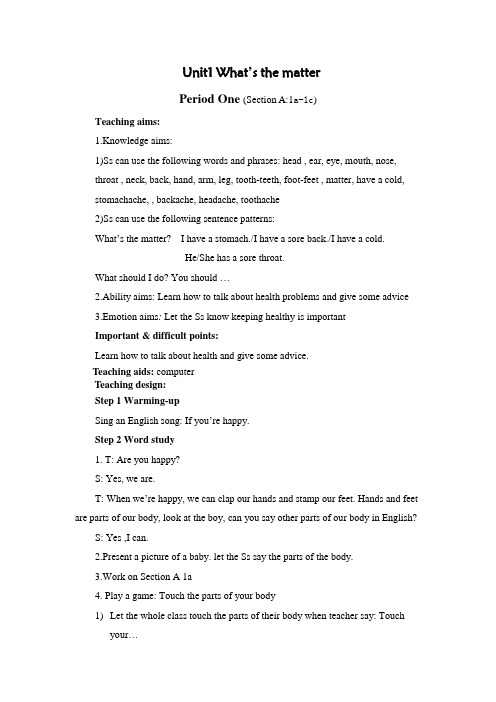
Unit1 What’s the matterPeriod One (Section A:1a-1c)Teaching aims:1.Knowledge aims:1)Ss can use the following words and phrases: head , ear, eye, mouth, nose,throat , neck, back, hand, arm, leg, tooth-teeth, foot-feet , matter, have a cold, stomachache, , backache, headache, toothache2)Ss can use the following sentence patterns:What’s the matter? I have a stomach./I have a sore back./I have a cold.He/She has a sore throat.What should I do? You should …2.Ability aims: Learn how to talk about health problems and give some advice3.Emotion aims: Let the Ss know keeping healthy is importantImportant & difficult points:Learn how to talk about health and give some advice.Teaching aids: computerTeaching design:Step 1 Warming-upSing an English song: If you’re happy.Step 2 Word study1. T: Are you happy?S: Yes, we are.T: When we’re happy, we can clap our hands and stamp our feet. Hands and feet are parts of our body, look at the boy, can you say other parts of our body in English?S: Yes ,I can.2.Present a picture of a baby. let the Ss say the parts of the body.3.Work on Section A 1a4. Play a game: Touch the parts of your body1)Let the whole class touch the parts of their body when teacher say: Touchyour…2)Ask six Ss to come to the front and do as the teacher tells them: Touchyour…if one does wrong, let him or her go back, the last one who in the front is the winner.(clap hands)Step 3 Presentation and practice1. T: Are you happy? Ss: Yes, we are.T: Look at the picture, is he happy?Ss: No, he isn’t.T: Why?(Help the Ss to answer: He has a stomachache.)2.Present other pictures, talk about health problems of the persons in the pictures. What’s the matter? He/She has a headache/ toothache /a sore back/ a sore throat/a cold and a cough.3. Let the Ss practice in pairs4. T: Suppose there is something wrong with your body .You may say: I have a headache. I have a sore throat.Step 4 ChantHead, head, I have a headache. I have a headache,Stomach, stomach, I have a stomachache. I have a stomachache,Ear, ear, I have an earache. I have an earache,Tooth, tooth, I have a toothache. I have a toothache.Back, back, I have a sore back. I have a sore back,Throat, throat, I have a sore throat. I have a sore throat.Oh, dear! Do more exercise, please and keep healthy!Step 5 listen and say1.Work on Section A 1b, listen and number the names 1-5.2.Listen again and talk about the health problems of the persons in the picture.Eg: Nancy has a toothache, Sarah has a cold,…Step6. PresentationGuessing gameThe teacher shows some part of the pictures to the Ss and let them guess .T: What’s the matter with him/her?S: Does he/she have a …?T: Yes, he/she has a cold. Can you give him/ her some advice? Whatshould he /she do?S: He /She should drink hot tea with honey/ shouldn’t speak more/ go to see a doctor… (Ss can give different advice as they like)T: What’s the matter with him/her?S: Does he/she have a …?T: Yes, he / she has a / an toothache /fever / headache / earache…Whatshould he /she do?S: He /She should go to see a dentist / shouldn’t eat ice cream/shouldn’tdrink cold water /lie down and rest / shouldn’t play basketball/ shoulddrink a lot of water./should see a doctor…Step7. PracticeGroup-work. Role play the conversations in 2b. Let the Ss read the conversations first. Then work in a group, make a new conversation .A: What’s the matter?B: My head feels very hot.A: Maybe you have a fever.B: What should I do?A: You should drink hot water and take some medicineStep 8 Summary。
人教新目标八年级英语下册教案Unit1Whatsthemat教案

Unit1 What’s the matter?复习课教学设计一、设计背景初中英语升学考试所涉及的知识面广,因而复习时需要扎扎实实打好基础,对课本的复习可以说是以“地毯式”搜捕的方式进行的。
教师要在有限的时间内完成如此大容量的复习任务,就必须要想方设法提高复习效率,让学生的复习取得事半功倍的效果。
我在复习中采用“知识递进式”复习法,用话题带动词句的使用,注重知识的综合运用。
二、设计理念本课是以“problems and advice”为话题的复习课,课堂上把主动权交给学生,以听说训练为主线,通过看、听、说、写等一系列教学活动,让学生运用所学知识来完成单词拼写、即时翻译短语、小组合作翻译句子,定时背诵语篇。
使学生获得最基本的英语听、说、读、写能力,并在教学中充分激发学生强烈的学习愿望。
在注重学生知识能力发展的同时,注重提高学生的人格修养,学会关心别人,帮助别人,达到培养学生互助的德育教育的目的。
三、教学目标设计用具体、明确、可操作的行为语言,描述本课的知识、技能、能力、方法、情感、态度、价值观等方面的教学目标。
Objectives: By the end of the session, most students will be better able to acquire the required information. This will be achieved by: 1.Knowledge Objectives:1)Be able to master the pronunciation, meaning and spellingof the names of diseases: fever, sore throat, sore back; stomachache, headache, toothache, cold, cough; 2) Be able tolearn the e某pressions of giving advice: lie down and rest, drink hot tea with honey, see a dentist, take this medicine;3) Be able to talk about health problems by using “What’s the matter? I have a?” and give advice by using “Youshould?You shouldn’t?” 2. Ability Objectives:1) Be able to talk about one’s health problems and give advice fluently; 2) Be able to role play doctor and patient; 3. Moral Objectives:1) Improve the cooperative spirit through pair work and role playing 2) Care more about yourself and your family members’ health. 四、教学重点难点设计由于本节课的话题是谈论健康,根据教学大纲的要求,学生需掌握有关疾病的单词,并能针对疾病提出合理的建议。
8B UNIT1 welcome教学案
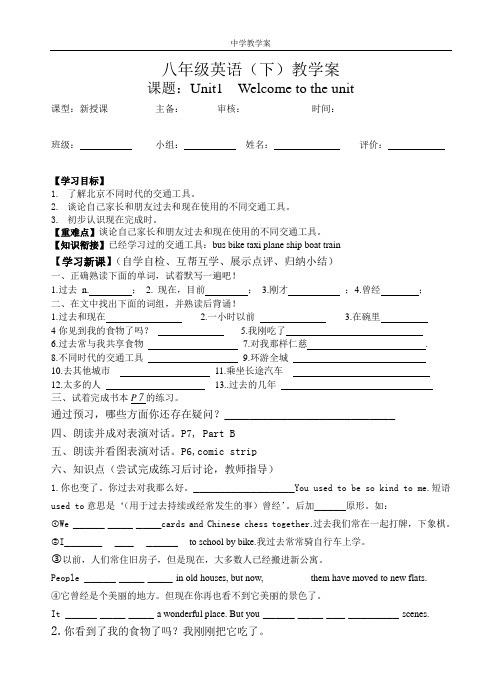
八年级英语(下)教学案课题:Unit1 Welcome to the unit课型:新授课主备:审核:时间:班级:小组:姓名:评价:【学习目标】1.了解北京不同时代的交通工具。
2.谈论自己家长和朋友过去和现在使用的不同交通工具。
3.初步认识现在完成时。
【重难点】谈论自己家长和朋友过去和现在使用的不同交通工具。
【知识衔接】已经学习过的交通工具:bus bike taxi plane ship boat train【学习新课】(自学自检、互帮互学、展示点评、归纳小结)一、正确熟读下面的单词,试着默写一遍吧!1.过去n. ;2. 现在,目前;3.刚才;4.曾经;二、在文中找出下面的词组,并熟读后背诵!1.过去和现在2.一小时以前3.在碗里4你见到我的食物了吗? 5.我刚吃了6.过去常与我共享食物7.对我那样仁慈.8.不同时代的交通工具9.环游全城10.去其他城市11.乘坐长途汽车12.太多的人13..过去的几年三、试着完成书本P 7的练习。
通过预习,哪些方面你还存在疑问?___________________________四、朗读并成对表演对话。
P7, Part B五、朗读并看图表演对话。
P6,comic strip六、知识点(尝试完成练习后讨论,教师指导)1.你也变了。
你过去对我那么好。
________________You used to be so kind to me.短语used to意思是‘(用于过去持续或经常发生的事)曾经’。
后加_____原形。
如:①We _____ ____ ____cards and Chinese chess together.过去我们常在一起打牌,下象棋。
②I______ ___ _____ to school by bike.我过去常常骑自行车上学。
③以前,人们常住旧房子,但是现在,大多数人已经搬进新公寓。
People _____ ____ ____ in old houses, but now,_____ ____ them have moved to new flats.④它曾经是个美丽的地方。
人教版八年级下册英语教案unit1
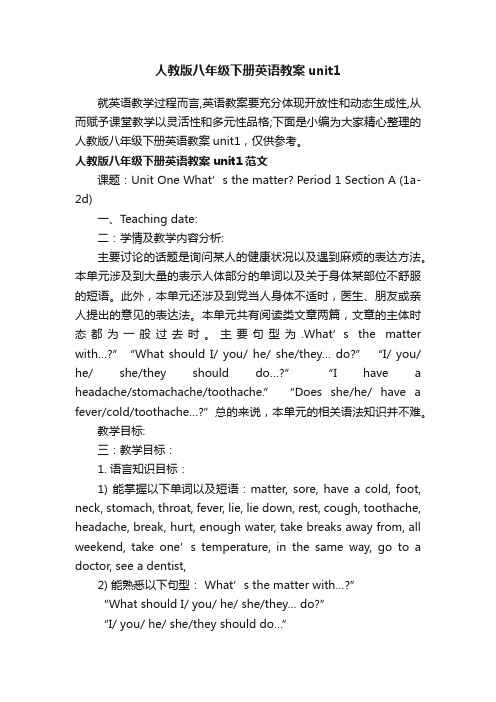
人教版八年级下册英语教案unit1就英语教学过程而言,英语教案要充分体现开放性和动态生成性,从而赋予课堂教学以灵活性和多元性品格;下面是小编为大家精心整理的人教版八年级下册英语教案unit1,仅供参考。
人教版八年级下册英语教案unit1范文课题:Unit One What’s the matter? Period 1 Section A (1a-2d)一、Teaching date:二:学情及教学内容分析:主要讨论的话题是询问某人的健康状况以及遇到麻烦的表达方法。
本单元涉及到大量的表示人体部分的单词以及关于身体某部位不舒服的短语。
此外,本单元还涉及到党当人身体不适时,医生、朋友或亲人提出的意见的表达法。
本单元共有阅读类文章两篇,文章的主体时态都为一般过去时。
主要句型为.What’s the matter with…?”“What should I/ you/ he/ she/they… do?” “I/ you/ he/ she/they should do…?” “I have a headache/stomachache/toothache.” “Does she/he/ have a fever/cold/toothache…?”总的来说,本单元的相关语法知识并不难。
教学目标:三:教学目标:1. 语言知识目标:1) 能掌握以下单词以及短语:matter, sore, have a cold, foot, neck, stomach, throat, fever, lie, lie down, rest, cough, toothache, headache, break, hurt, enough water, take breaks away from, all weekend, take one’s temperature, in the same way, go to a doctor, see a dentist,2) 能熟悉以下句型:What’s the matter with…?”“What should I/ you/ he/ she/they… do?”“I/ you/ he/ she/they should do…”2. 情感态度价值观目标:教会学生关心他人,培养同学间团结、友善的精神。
八年级英语下册 Unit1精品教学案(共10课时) 牛津译林版
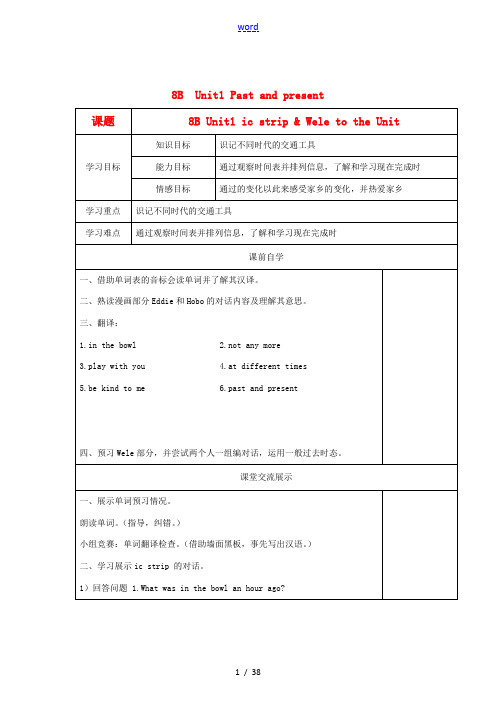
8B Unit1 Past and present8B Units1导学案参考答案Unit1第一课时:一、1.was 2.has eaten 3.to have 4.to play 5.is eating 6.took 7.rode8.will be二、1.would like , grows up 2.walks to school 3.goes to work by bus 4.flies to5.don’t want to any more第二课时:一、1.know about 2.get married 3.move out 4.water pollution 5.in the centreof6.feel lonely7.turn into8.from time to timeed to do 10.in some ways二、well has lived southern got married in the centre of children has changed a lotmarket stallsHas turned into to play cards pleasant shoe factory waste waterfish and plants polluted took action cleaner in some ways open space lonely第三课时:一、1. I don’t want to play with you any more.2.There used to be the home of birds.3.He live in Beijing since he moved here.4.In the past ,many people had no money to go to school.5.Nanjing has changed a lot in the past five years.6.Many friends have moved to other places ,so I feel lonely from time to time.7.I had an interview with my Chinese teacher this morning.8.It has bee more difficult to play chess with my old friends.二、1.Where have they gone ..2.How long has lived3.When was born4.you helping me第四课时:一、1.dishonest 2.unhappy 3.unlucky 4.impolite 5.unkind二、D C C B C A三、1.cheaper 2.healthiest 3.impossible 4.safely 5.well better第五课时:一、1.They haven’t read the book yet.Have they read the book yet? Yes, they have/ No , they haven’t1.How long has Daniel stayed in Shanghai?2. I have known him for ten years.3.Sandy has been in Beijing for half an hour.二、1. Have seen have did see2.lent hasn’t given 3.have been did visit第六课时:一、C C A A D B二、1. He has already finished homework.2.Have you ever been to Beijing?3.I have known Linda for 3years.4. I have just seen Lily.5.We haven’t heard from him for a long time.第七课时:一、1.is 2.do 3.will be 4.shall go 5.taught 6.has taught 7.has gone8.Have seen 9.have learned 10.will arrive二、1.How long have you known him?2.Has Jane finished her homework?3.I haven’t worked in this school for two years.4.Why hasn’t Jim finishedhis homework?5.when did you buy this watch?6.Who is the old man next to Lily?7.Which girl is my sister?8.How far is your home from your school?第八课时:一、1.advantages 2.reduce 3.changed 4.developments 5.service6.interview7.realizes 9.repair二、1.recently 2.unpleasant 3.impolite 4.have done 5.left6.southern7.polluted8.Has arrived arrived9.has eaten 10.have been第九课时:第十课时:一、1.as often as before 2. have an interview with sb ed to do sth 4.so big and modern5.in the north of二、1. was has lived 2.was made 3.Has arrived arrived 4.has eaten5.safely6.has been7.have been三、1.B 2.C 3.B 4.C 5.D 6.A四、1.Have you anything 2.doesn’t provide any longer 3.since ago ed to5.has been to。
人教版八年级英语下册《Unit 1 Unit 1 What’s the matter?》教案.doc
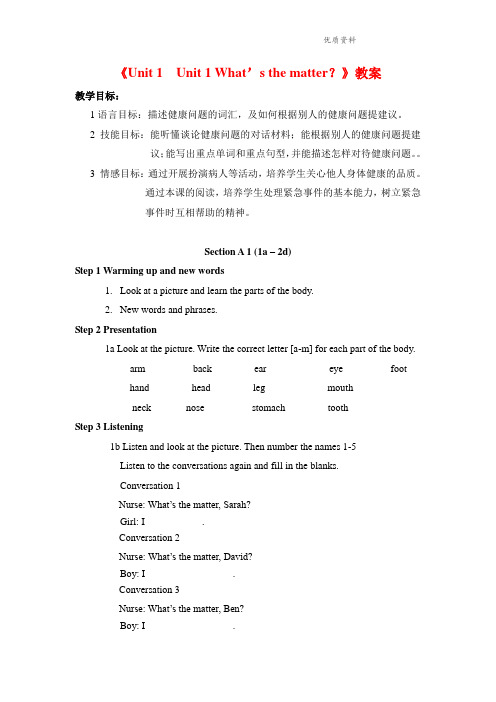
《Unit 1 Unit 1 What’s the matter?》教案教学目标:1语言目标:描述健康问题的词汇,及如何根据别人的健康问题提建议。
2 技能目标:能听懂谈论健康问题的对话材料;能根据别人的健康问题提建议;能写出重点单词和重点句型,并能描述怎样对待健康问题。
3 情感目标:通过开展扮演病人等活动,培养学生关心他人身体健康的品质。
通过本课的阅读,培养学生处理紧急事件的基本能力,树立紧急事件时互相帮助的精神。
Section A 1 (1a – 2d)Step 1 Warming up and new words1.Look at a picture and learn the parts of the body.2.New words and phrases.Step 2 Presentation1a Look at the picture. Write the correct letter [a-m] for each part of the body.___arm ___ back ___ ear ___ eye ___ foot___hand ___ head ___ leg ___ mouth___ neck ___nose ___ stomach ___ toothStep 3 Listening1b Listen and look at the picture. Then number the names 1-5Listen to the conversations again and fill in the blanks.Conversation 1Nurse: What’s the matter, Sarah?Girl: I ___________.Conversation 2Nurse: What’s the matter, David?Boy: I _________________.Conversation 3Nurse: What’s the matter, Ben?Boy: I _________________.Conversation 4Nurse: What’s the matter, Nancy?Girl: I _________________.Conversation 5Betty: What’s the matter, Judy?Ann: She __________________.Step 4 Speaking1c Look at the pictures. What are the students’ problems? Make conversati ons.ExamplesA: What’s the matter with Judy?B: She talked too much yesterday and didn’t drink enough water.She has a very sore throat now.A: What’s the matter with Sarah?B: She didn’t take care of herself on the weekend. She was p laying withher friends at the park yesterday. Then it got windy, but she didn’t puton her jacket. Now she has a cold.Step 5 Guessing gamesGuess what has happened to the students by using the important sentenc es. Step 6 Listening2a Listen and number the pictures [1-5] in the order you hear them.2b Listen again. Match the problems with the advice.Step 7 Speaking2c Make conversations using the information in 2a and 2bA: What’s the matter?B: My head feels very hot.A: Maybe you have a fever.B: What should I do?A: You should take your temperature.Step 8 Role–playImagine you are the school doctor. A few students have health problems.Role-play a conversation between the doctor and the students.2d Role –play the conversationStep 9 Language points and summary1. What’s the matter?这是人们特别是医生和护士询问病人病情时最常用的问句, 意思是“怎么了?”其后通常与介词with连用。
- 1、下载文档前请自行甄别文档内容的完整性,平台不提供额外的编辑、内容补充、找答案等附加服务。
- 2、"仅部分预览"的文档,不可在线预览部分如存在完整性等问题,可反馈申请退款(可完整预览的文档不适用该条件!)。
- 3、如文档侵犯您的权益,请联系客服反馈,我们会尽快为您处理(人工客服工作时间:9:00-18:30)。
1.Know something more about spring;
2.The compound words.
教学难点
1.When does spring begin?
2.What do you know about spring?
3.What is the weather like?
教学方法
4. On a ________ (snow) day, you can go skating. snowy
5. It’s a __________ (fun) story, we all like it. funny
6. Don’t be _________ (scare) of that dog, it is _______ (friend) to people. scared,friendly
Winter.
What is the difቤተ መጻሕፍቲ ባይዱerence between spring weather and winter weather?
…
What is the difference between people’s clothes and activities in spring and winter?
Talk about the weather
引起学生兴趣
二.
自
主
探
究
. Learn new words and structures of the text.
At first learn by themselves, then the teacher corrects if necessary.
三.
sun sunny
rain rainy
fog foggy
cloud cloudy
snow snowy
sand sandy
名词+y形容词
六.
课
堂
练
习
1. The sunin the east .The sunin the west .(rises,sets)
2. He oftena shower after work .(takes)
4. What season ________ (come) before spring?(comes)
5. The snow _________________ (not melt) easily in winter .(doesn’t melt)
6. Thunders _________ (make) a loud noise .(make)
反思(评议)
晓岚中学电子教案备课模板
累计节次二授课时间:
教者
年级
八年级下
学科
英语
课题
Unit 1 Lesson2 It is Getting Warmer!
教学目标
1. Master words and expressions: neither…nor…blossom swing
2. Oral words and expressions: boot jasmine Tai Chi
合
作
交
流
Work in their groups to learn the text, find out the questions, the importance.
Discuss these questions in a small group:
What season comes before spring?
六.
课
堂
练
习
1. The sun ______ (rise ) at six this morning .(rose)
2. Did you know lightning is sometime________ (hot) than the sun .(hotter)
3. When he grew up, he ________ (become) a doctor.(became)
教学方法
合作探究
教学流程
环节
教师引导
设计意图
一.
情
景
导
入
Every thing can’t grow without the sun. The sun is the most important to us, too. Without it, we will be unhealthy. So let’s sing a song for it.“Sun Is Rising.”
7. In April, rain _________ (shower) begin .(showers)
通过练习检测所学内容,达到巩固目的。
作业
1.Finish off the activity book.
2.Write a composition about spring.
板
书
设
计
Lesson 2 It’s Getting Warmer!
通过练习检测所学内容,达到巩固目的。
作业
1.Find something that represents spring and show it to the class next time.
2.Finish off the activity book.
板
书
设
计
Lesson1: What’s the Weather Like?
either…or…或者...或者
both…and…两者都
neither…nor…两者都不
not only…but also…不但…而且
反思(评议)
累计节次三授课时间:
教者
年级
八年级下
学科
英语
课题
Unit 1 Lesson3 The Sun Is Rising
教学目标
Mastery words and expressions: one by one, change
…
互帮互助印象深刻,共同提高,最大限度提高课堂效率。
四.教
师
解
惑
either…or…或者...或者Either you or I am gong to go there.. both…and…两者都Both my father and my mother are teachers. neither…nor…两者都不Neither he or she works hard.
Let the students understand the sun is the most important to us.
二.
自
主
探
究
Learn the new words and phrases of the text with the help of the pictures.
晓岚中学电子教案备课模板
累计节次一授课时间:
教者
闫国英
年级
八年级下
学科
英语
课题
Unit 1 Lesson1 How is the weather?
教学目标
1. Mastery words and expressions: shower, rise, rose, risen, set
2. Oral words and expressions: thunder, storm, sunrise, sunset
一.
情
景
导
入
Hello, everyone. Did you have a good time during the Spring Festival? I think you did. The weather of the Spring Festival was very sunny. The winter was over. The spring is coming. By the way, what’s the weather like today, let’s talk about the weather in spring.
Talk about the weather
引起学生兴趣
二.
自
主
探
究
. Learn new words and structures of the text.
At first learn by themselves, then the teacher corrects if necessary.
三.
What’s the weather like? =How is the weather?
It’s windy/snowy…
. It will be(rain) this afternoon .(rainy)
There will be(rain) this afternoon .(rain)
It’s going to(rain) this afternoon .(rain)
3. He iscareless, heputhis books in LiuLi’s schoolbag .(rather)
4. There arein summer inChina.(showers)
5. It will be(rain) this afternoon .(rainy)
There will be(rain) this afternoon .(rain)
合作探究
教学流程
环节
教师引导
设计意图
一.
情
景
导
入
Hello, everyone. Spring comes here. Do you like spring? I like it very much because every thing becomes to turn green. It’s the beginning of the year. And the important point is that the weather is getting warmer and warmer.
